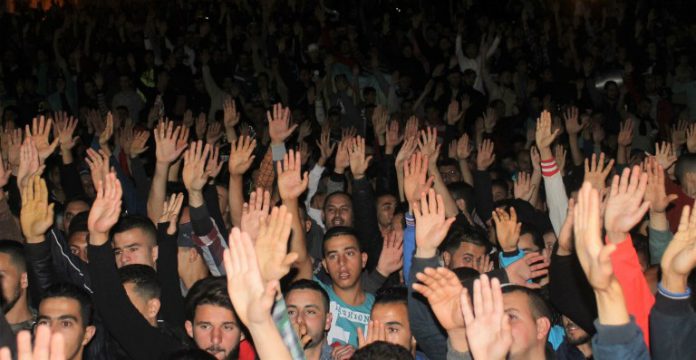Despite its ban by the authorities of Morocco: The Hirak maintains the protest planned today
The population of the Rif in Morocco continues to express its anger despite the repression exerted by the authorities who have banned the planned demonstration for today of the Hirak movement.

The right to work and other social demands expressed by the Rif population in Morocco motivate the determination of the Hirak to defy the decision taken by the authorities of Morocco to ban the demonstration today. Hirak, a movement calling for development measures in the northern landlocked area, also requires the release of prisoners detained since the beginning of the crisis. A total of 176 demonstrators are in custody, according to official figures.
Others have already been sentenced to up to 20 years in prison. Nasser Zefzafi, one of the main leaders of the movement, has launched a call to protest in the city of Al Hoceima from the prison where he is imprisoned. But the prefecture decided to ban the event with the support of the parties of the government majority. "There is a risk of confrontation," says a lawyer for the movement. The call is still widely distributed on social networks. At the beginning of the tourist season two weeks ago, the authorities announced the "gradual withdrawal" of the police forces in the main public places of Al Hoceima. They also announced an emergency plan to boost the economy in the region. Measures that clearly did not suffice to extinguish the fire of the Rif. The demonstration prohibited by the Moroccan authorities may lead to repression denounced by non-governmental organizations.
Many supporters of the Hirak movement have been imprisoned for a few months after the Rif population expressed its anger at the harsh social conditions.
Marches have been organized in other provinces of Morocco, including Rabat, in solidarity with the population of Al Hoceima. The power of Morocco is accused of repressing the population, and confrontations have opposed the month of Ramadhan of the police to the protesters. Since October 2016 and the death of a young fish dealer in the country, Mouhcine Fikri, crushed in a dumpster as he tried to prevent the destruction of his goods seized by the police, mobilization never ceased In Al-Hoceima and in several localities.
It even hardened. If the first processions demanded justice for the death of the young Rifain, rallies quickly became a wider movement of economic and social demands for this enclaved area. The popular protest was peaceful until the Moroccan police launched a crackdown on protesters demanding the improvement of their economic conditions, including the fight against unemployment. The demonstration of today, prohibited by the authorities of Morocco, is maintained by the Hirak.

The right to work and other social demands expressed by the Rif population in Morocco motivate the determination of the Hirak to defy the decision taken by the authorities of Morocco to ban the demonstration today. Hirak, a movement calling for development measures in the northern landlocked area, also requires the release of prisoners detained since the beginning of the crisis. A total of 176 demonstrators are in custody, according to official figures.
Others have already been sentenced to up to 20 years in prison. Nasser Zefzafi, one of the main leaders of the movement, has launched a call to protest in the city of Al Hoceima from the prison where he is imprisoned. But the prefecture decided to ban the event with the support of the parties of the government majority. "There is a risk of confrontation," says a lawyer for the movement. The call is still widely distributed on social networks. At the beginning of the tourist season two weeks ago, the authorities announced the "gradual withdrawal" of the police forces in the main public places of Al Hoceima. They also announced an emergency plan to boost the economy in the region. Measures that clearly did not suffice to extinguish the fire of the Rif. The demonstration prohibited by the Moroccan authorities may lead to repression denounced by non-governmental organizations.
Many supporters of the Hirak movement have been imprisoned for a few months after the Rif population expressed its anger at the harsh social conditions.
Marches have been organized in other provinces of Morocco, including Rabat, in solidarity with the population of Al Hoceima. The power of Morocco is accused of repressing the population, and confrontations have opposed the month of Ramadhan of the police to the protesters. Since October 2016 and the death of a young fish dealer in the country, Mouhcine Fikri, crushed in a dumpster as he tried to prevent the destruction of his goods seized by the police, mobilization never ceased In Al-Hoceima and in several localities.
It even hardened. If the first processions demanded justice for the death of the young Rifain, rallies quickly became a wider movement of economic and social demands for this enclaved area. The popular protest was peaceful until the Moroccan police launched a crackdown on protesters demanding the improvement of their economic conditions, including the fight against unemployment. The demonstration of today, prohibited by the authorities of Morocco, is maintained by the Hirak.
Comments
Post a Comment